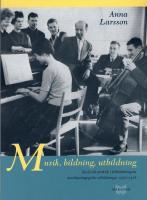
Det moderna samhällets vetenskap - Om etableringen av sociologi i Sverige 1930-1955
Häftad bok. Umeå universitet. Humanistiska fakulteten. 2001. 219 sidor.
Mycket gott skick. Hanteringsspår på pärmen. Fin inlaga. [rum 12]
Förlagsfakta
- ISBN
- 9173050474
- Titel
- Det moderna samhällets vetenskap [Elektronisk resurs] Om etableringen av sociologi i Sverige 1930-1955
- Författare
- Larsson, Anna - Umeå universitet Humanistiska fakulteten
- Utgivningsår
- 2019
- Språk
- Svenska
- Baksidestext
- This work describes how sociology as an academic discipline was introduced, established and pursued at Swedish universities during the period 1930-1955. The main purpose is to follow the establishment of sociology and call attention to dominating ideas of sociology, science and society, and also to reflect the relation between sociology and the demands and expectations of society. This academic institutionalization is considered a continuously changing process where centers and boundaries are formulated and reformulated in accordance with contemporary conditions and preferences of the actors. Expectations on the discipline are investigated, as they were expressed in official inquiries and other political settings as well as in common press. Changes in university structure that led up to the establishment of sociology as a discipline are studied, as well as the official investigations that directly preceded the set up. Institutional activities in the new discipline are dealt with; as are persons, curricula, dissertations and investigations. Internal debates and conflicts are studied and analyzed. The reception of sociology is considered, as well as the use of sociological knowledge in academy, industry and other domains. A main question is how sociology, when established, was understood and pursued. Soon, a clear conception was established in leading quarters. According to this conception, sociology was to be recognized as a specialized discipline alongside other disciplines of social science. The object of sociology was to study modern society and its social conditions, preferably in Sweden. The method of study was to be scientifically empirical, which, above all, meant quantitative field surveys. This study analyzes the formation of this idea of sociology. It was contested, but persons representing deviating conceptions were marginalized. The "boundary-work" that was carried out is therefore considered especially significant. The boundaries were about the implication of the concept of sociology, and conflicts and antagonisms revealed in the boundary-work are analyzed. It is argued that the polemical and dichotomizing rhetoric style used by the actors was of significant importance. By describing, defining and legitimating sociology in terms of opposites: empirical rather than speculative, American rather than continental, quantitative rather than qualitative, it was emphasized that the discipline of sociology was new, scientific and necessary for a modern and progressive community like Swedish society.
Diss. Umeå : Umeå universitet, 2001














